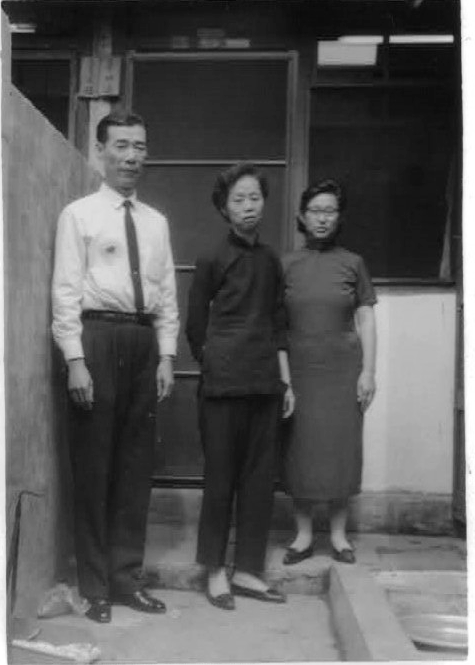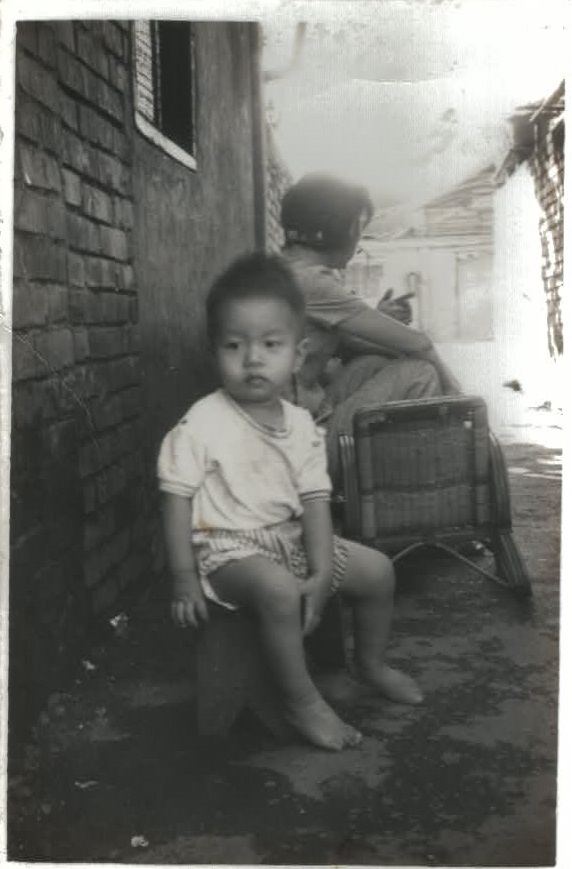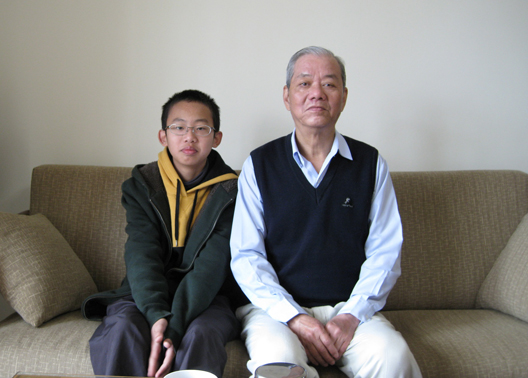Grandpa Jia’s Memories of the Forty-Four South Village
Jia Weixuan, whose grandfather used to live in the Forty-Four South Village, is a member of our research team. Grandpa Jia is the second gereration of the military dependents quarters. In the early stage of our research, Grandpa Jia came with us to visit Taipei Xinyi Public Assembly Hall, but during the short visit, Grandpa Jia, who doesn’t talk much, didn’t share with us all the stories about the Forty-Four South Village in detail. Therefore Weixuan was designated to interview his grandpa. The interview, which was completed during the new year holidays of the Horse Year, provided us with a better view of the Forty-Four South Village.
Time:Chinese New Year’s Eve, 2014
Place: Jia Weixuan’s grandfather’s house
Questionnaire designed by Wuxing Research Team for the Forty-Four South Village
Question 1: How old were you when you moved to Taiwan? Did you come with your family from Shandong or somewhere else? (Some written material shows that the 44th Arsenal was moved from Shandong to Taipei.)
Grandpa Jia:Originally we retreated to Taiwan with the Kuomintang Army from Shandong, including Jia Weixuan’s great-grandparents, grandfather and myself. I was a three- year-old child at that time. I still remember that night we started to retreat. My father’s ancestral hometown was Qingdao, and he worked for the British Bureau of National Affairs. Just like Shanghai, there were a lot of foreign consulates in Tianjin. He also worked in the Longhai Jin-Pu Railway Company, thus he was a civil servant rather than a military identity when we retreated.

Weixuan’s great-grandparents
Question 2: We would like to know the location of the arsenal (Was it located in the area of present Shin Kong Mitsukoshi’s Taipei Xinyi Place?)
Grandpa Jia:The arsenal ranged from Keelung Road to Songde Road, fifth section of Xinyi Road to fifth section of Chunghsiao East Road, and the Taipei 101, Grand Hyatt, World Trade Center are all included in its range.
Question 3: Was Si-Si Pupil School affiliated with Si-Si Kindergarten? When was Si-Si Kindergarten established? (The actual start time is not shown in the data.)
Grandpa Jia:Si-Si Pupil School wasn’t affiliated with Si-Si Kindergarten. Si-Si Pupil School became the present Xinyi Elementary School. My father's handwritten notes shows that Si-Si Kindergarten had existed since 1952, so it should’ve been established a few years after the arsenal retreated to Taiwan in 1949. At that time, people often borrowed space from the kindergarten for wedding banquets.
Question 4: Where was your house in the village? (Grandpa Jia can roughly show us the location with attached map of the Village) How many people were there in your family? How big was your house? What about if there was not enough space? When grandpa got married and grandma moved in, how did you make rooms for more incoming family members?
Grandpa Jia:Our house, which was in the C group of constructions, was neighboring present Xinyi Elementary School, but it had been demolished. In early days, the Forty-Four South Village was divided into A, B, and C groups of instructions. The size of our house (for a family of six people) was only five pings. (One ping = 3.3057 square meters) When the space wasn’t enough for us, we had a loft conversion to make rooms. The upper space was for kids. Soon after I got married, I rented an apartment house on Zhuang Jing Road and we moved out from the old house. The apartment is exactly the upstairs of present Dachang Freight Company. Had we not moved out, the room would have been really insufficient for our needs.
Question 5: It’s well-known that military dependents' village mothers have great culinary skills. What’s your impression of the food from the Forty-Four South Village?
Grandpa Jia: Frankly speaking, these so-called “great culinary skills” were gained under the bad living condition. Due to scarcity of goods, village mother in each family had to make good use of everything edible that they had at hand. It’s not so exaggerated like what the TV play shows. The home cuisine they made once in a while was to relief the homesickness, hence everything they made was delicious. The Nan Cun Snack Bar was started up at that time only to earn a living. Besides, people didn’t have anything to entertain themselves after work, so they gathered at snack bars eating, drinking and chitchatting. One thing impressed me most was my mom’s handmade Perfect Vegetarian Dumplings, which was made of some sliced dried bean curd, tree fungus, Chinese vermicelli and whatever ingredients she had. The cuisine was only made for Chinese New Year holidays.
Question 6: Would you share with us more stories about joys and sorrows of life in the Forty-Four South Village?
Grandpa Jia:At that time, electricity wasn’t provided all day. Electricity was provided three times a day from 6:00am to 8:00am, 12:00pm to 1:00pm, and 5:00pm to 8:00pm. There were men’s bathrooms in the arsenal, and men usually took a shower before they went home. Sometimes my father came home from work and took me back to the arsenal for a shower. As for women, they had to take a bath in the yard, but there was no running water. You needed to go to the square to fetch water, and that’s why the square was called “Wushantou”, which sounds like the famous reservoir in Taiwan. My mother had run a small grocery store to earn a living since I was a kid. In my childhood, I had to help deliver goods to customers without means of transportation. I had to walk quite a long way so far as getting to the present Xie-He High School of Industry and Commerce.
Question 7: Was there a creek passed through the village? Where was it approximately?
Grandpa Jia:There were, I should say, large ditches. People went swimming or did laundry there. The ditches are now under the ground of the fifth section of Xinyi Road, all the way to the underground of Keelung Road.
Question 8: Were the machine gun bunkers built during the the Forty-Four South Village era or the Japanese occupation era?
Grandpa Jia: The machine gun bunkers were built during the the Forty-Four South Village era.
Question 9: How about the air-raid shelters? Were they built during the the Forty-Four South Village era or the Japanese occupation era??
Grandpa Jia:The air-raid shelters were also built during the the Forty-Four South Village era, and they were built overground rather than underground. There had been two of them, one still exists next to Xinyi Elementary School, but the other one, located between constructions A and B, had been demolished already.
Question 10: How many times had the Forty-Four South Village been flooded? When did the floods usually come? What did people do about it?
Grandpa Jia:The village had been flooded every time when there was a typhoon coming. It had been too many times to recall. All the furniture had been ruined by water. When floods came, children stayed in the lofts, and adults took urgent steps to save stuffs from water.
11、Question 11: Do grandpa and grandma have some words or advice for your grandson Weixuan?
Grandpa Jia:Grandpa Jia: Life was really hard due to the macroeconomic environment in early days. However, our society has been improving into a better-off one. When you have a good standard of living, you shall cherish what you have, and don’t forget how difficult life was in the old days.
Question 12: As for nostalgia, what does it mean to each generation of the military dependents’ village? What are your feelings and ideas for home? ( Weixuan’s mother took the responsibility of interviewing the three generations of Jia’s family)
Grandpa Jia:Honestly, so-called nostalgia for hometown had waned in my generation because we came here when we were kids. We grew up here. Our hometown is actually here in Taiwan. After the government allowing people to visit relatives across the Taiwan Strait, I went with my parents to their hometown to see relatives in mainland, but the lifestyle there was so different that my father just couldn’t fit himself into their way of living, so he just stay there for two months and couldn’t stay any longer. Afterwards he still went there twice, but it was like sightseeing rather than visiting relatives. After my father’s generation passes away, the term “military dependents’ villages” will not be mentioned any more. They were products of the historic background at that time. Anticipation of my father’s generation had converted into a situation of no choice, and eventually they reluctantly accepted their fate. As to my generation, Taiwan is our home.
Weixuan’s Dad:As for my generation, the military dependents’ ' village only means my grandparents’ home, it was the after-school day-care playground. As far as my grandfather's hometown, it is just a place I’ve never been to.
Weixuan’s Mom: As for Weixuan’s generation, if it weren't for the teacher and the project, they had long forgotten themselves as children of military dependents’ villages. As time changes so fast, once the stories of the certain era were lost, they would be buried in the flow of time.
Question 13: Does Weixuan have anything to say after listening to Grandpa’s story?
Weixuan:Ha-ha! I can hardly imagine the days without water and electricity. I take my time when taking a shower, and I also love to play computer games. What I learned from grandpa’s stories is that we should save water and cherish everything we have.

Weixuan’s father at the Village in his childhood
At last Weixuan’s father added:
Weixuan’s Dad: In our childhood, we used to pick up bullet debris from the shooting range behind the Forty-Four South Village. The bullet debris could be bartered for a complete cartridge case. The shooting range was located in the position of the Zhong Qiang Park. But to pick up debris, we must wait until we heard the signal of the end of the shooting test. Once someone hadn’t been patient enough, and he was shot with a bullet in the range. Someone else picked up a dud bomb. The Arsenal also made flares and fireworks for Double Tenth National days and tested them in the shooting range, so we could see fireworks very often.

Grandpa Jia and Jia Weixuan

